Health & Social Care: Personal Contributions to Team Effectiveness
VerifiedAdded on 2024/06/03
|6
|1422
|322
Report
AI Summary
This report evaluates a healthcare professional's effectiveness within health and social care teams, focusing on personal contributions and areas for improvement. It critically reflects on activities undertaken in the workplace, self-criticizes approaches used, and explains how limitations in one's role can impact teamwork. The report analyzes the individual's role in minimizing barriers to effective teamwork, emphasizing communication, shared goals, and adherence to ethical codes. It further discusses innovative strategies, such as utilizing ICT tools and performance appraisal systems, to enhance personal contributions and improve the collective effectiveness of the team, ultimately aiming to improve service user outcomes. Desklib provides a platform to access this and similar solved assignments.
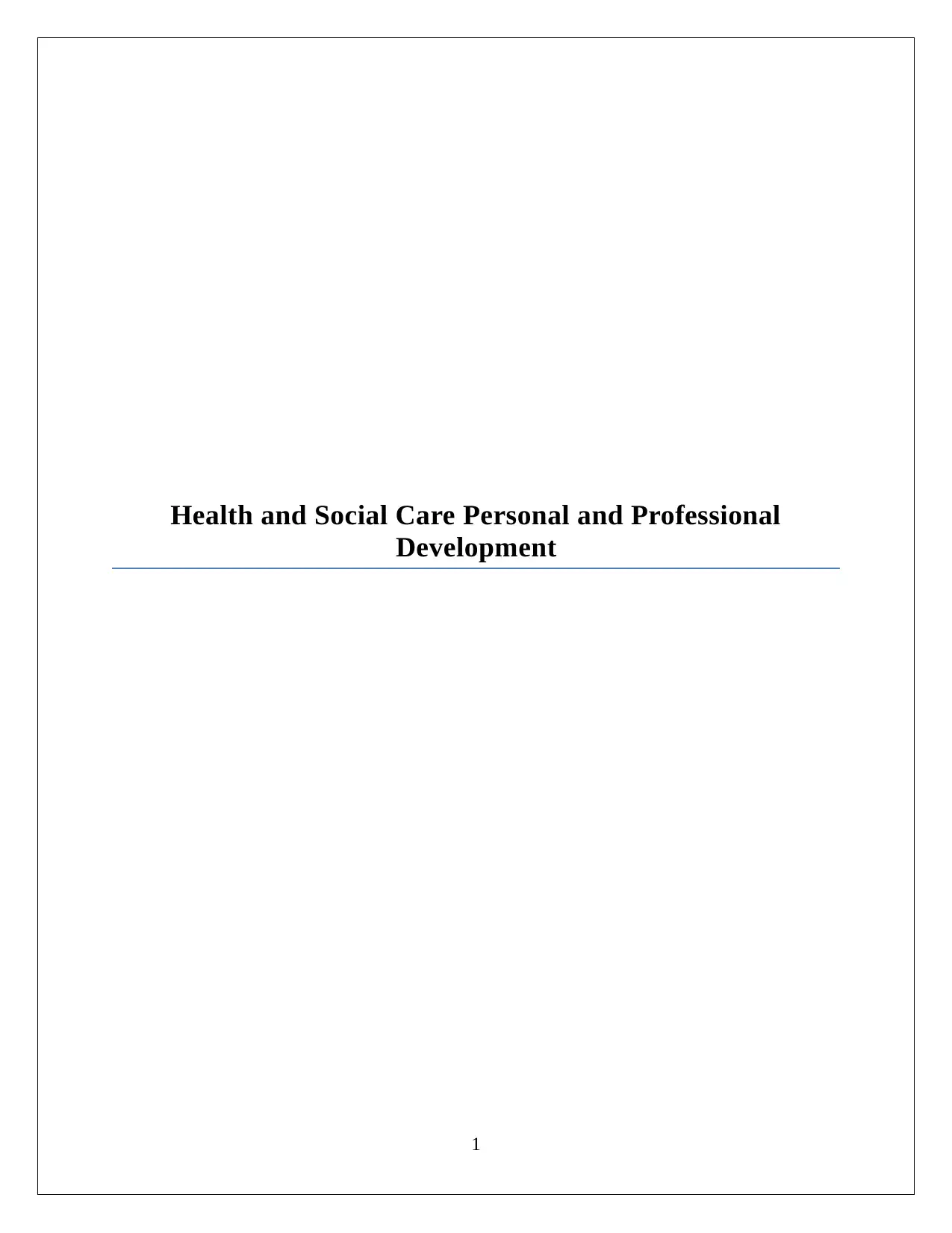
Health and Social Care Personal and Professional
Development
1
Development
1
Paraphrase This Document
Need a fresh take? Get an instant paraphrase of this document with our AI Paraphraser
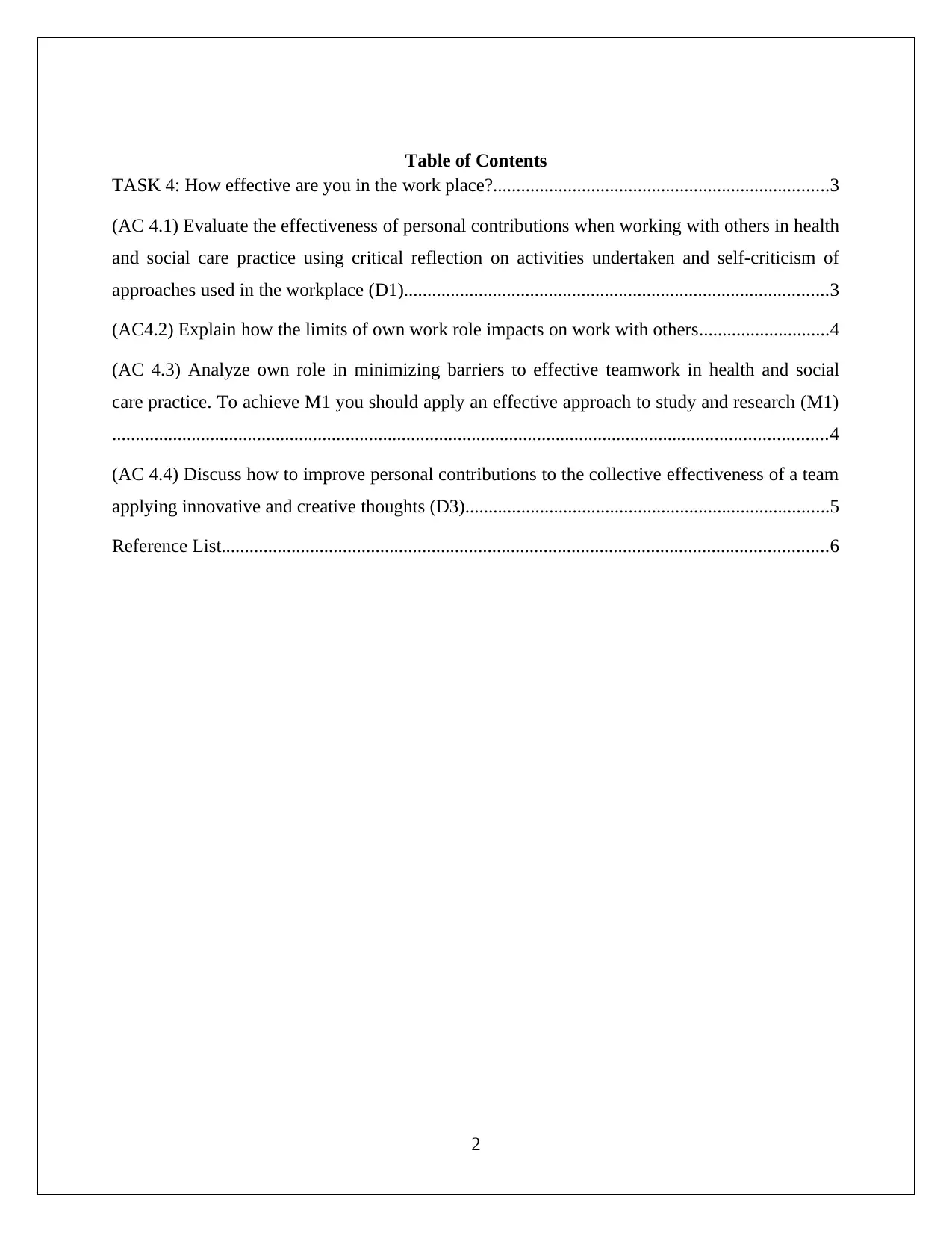
Table of Contents
TASK 4: How effective are you in the work place?........................................................................3
(AC 4.1) Evaluate the effectiveness of personal contributions when working with others in health
and social care practice using critical reflection on activities undertaken and self-criticism of
approaches used in the workplace (D1)...........................................................................................3
(AC4.2) Explain how the limits of own work role impacts on work with others............................4
(AC 4.3) Analyze own role in minimizing barriers to effective teamwork in health and social
care practice. To achieve M1 you should apply an effective approach to study and research (M1)
.........................................................................................................................................................4
(AC 4.4) Discuss how to improve personal contributions to the collective effectiveness of a team
applying innovative and creative thoughts (D3)..............................................................................5
Reference List..................................................................................................................................6
2
TASK 4: How effective are you in the work place?........................................................................3
(AC 4.1) Evaluate the effectiveness of personal contributions when working with others in health
and social care practice using critical reflection on activities undertaken and self-criticism of
approaches used in the workplace (D1)...........................................................................................3
(AC4.2) Explain how the limits of own work role impacts on work with others............................4
(AC 4.3) Analyze own role in minimizing barriers to effective teamwork in health and social
care practice. To achieve M1 you should apply an effective approach to study and research (M1)
.........................................................................................................................................................4
(AC 4.4) Discuss how to improve personal contributions to the collective effectiveness of a team
applying innovative and creative thoughts (D3)..............................................................................5
Reference List..................................................................................................................................6
2
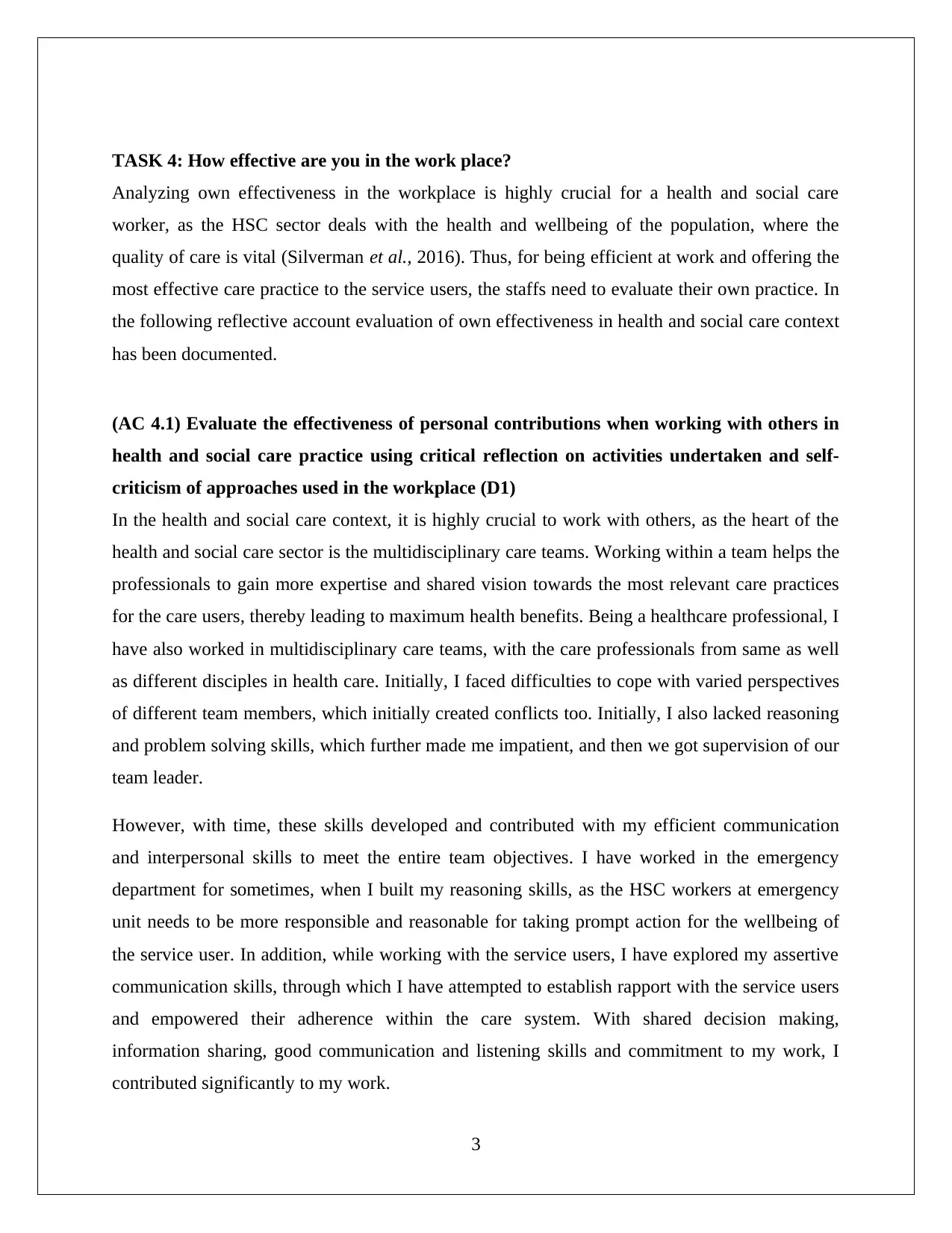
TASK 4: How effective are you in the work place?
Analyzing own effectiveness in the workplace is highly crucial for a health and social care
worker, as the HSC sector deals with the health and wellbeing of the population, where the
quality of care is vital (Silverman et al., 2016). Thus, for being efficient at work and offering the
most effective care practice to the service users, the staffs need to evaluate their own practice. In
the following reflective account evaluation of own effectiveness in health and social care context
has been documented.
(AC 4.1) Evaluate the effectiveness of personal contributions when working with others in
health and social care practice using critical reflection on activities undertaken and self-
criticism of approaches used in the workplace (D1)
In the health and social care context, it is highly crucial to work with others, as the heart of the
health and social care sector is the multidisciplinary care teams. Working within a team helps the
professionals to gain more expertise and shared vision towards the most relevant care practices
for the care users, thereby leading to maximum health benefits. Being a healthcare professional, I
have also worked in multidisciplinary care teams, with the care professionals from same as well
as different disciples in health care. Initially, I faced difficulties to cope with varied perspectives
of different team members, which initially created conflicts too. Initially, I also lacked reasoning
and problem solving skills, which further made me impatient, and then we got supervision of our
team leader.
However, with time, these skills developed and contributed with my efficient communication
and interpersonal skills to meet the entire team objectives. I have worked in the emergency
department for sometimes, when I built my reasoning skills, as the HSC workers at emergency
unit needs to be more responsible and reasonable for taking prompt action for the wellbeing of
the service user. In addition, while working with the service users, I have explored my assertive
communication skills, through which I have attempted to establish rapport with the service users
and empowered their adherence within the care system. With shared decision making,
information sharing, good communication and listening skills and commitment to my work, I
contributed significantly to my work.
3
Analyzing own effectiveness in the workplace is highly crucial for a health and social care
worker, as the HSC sector deals with the health and wellbeing of the population, where the
quality of care is vital (Silverman et al., 2016). Thus, for being efficient at work and offering the
most effective care practice to the service users, the staffs need to evaluate their own practice. In
the following reflective account evaluation of own effectiveness in health and social care context
has been documented.
(AC 4.1) Evaluate the effectiveness of personal contributions when working with others in
health and social care practice using critical reflection on activities undertaken and self-
criticism of approaches used in the workplace (D1)
In the health and social care context, it is highly crucial to work with others, as the heart of the
health and social care sector is the multidisciplinary care teams. Working within a team helps the
professionals to gain more expertise and shared vision towards the most relevant care practices
for the care users, thereby leading to maximum health benefits. Being a healthcare professional, I
have also worked in multidisciplinary care teams, with the care professionals from same as well
as different disciples in health care. Initially, I faced difficulties to cope with varied perspectives
of different team members, which initially created conflicts too. Initially, I also lacked reasoning
and problem solving skills, which further made me impatient, and then we got supervision of our
team leader.
However, with time, these skills developed and contributed with my efficient communication
and interpersonal skills to meet the entire team objectives. I have worked in the emergency
department for sometimes, when I built my reasoning skills, as the HSC workers at emergency
unit needs to be more responsible and reasonable for taking prompt action for the wellbeing of
the service user. In addition, while working with the service users, I have explored my assertive
communication skills, through which I have attempted to establish rapport with the service users
and empowered their adherence within the care system. With shared decision making,
information sharing, good communication and listening skills and commitment to my work, I
contributed significantly to my work.
3
⊘ This is a preview!⊘
Do you want full access?
Subscribe today to unlock all pages.

Trusted by 1+ million students worldwide
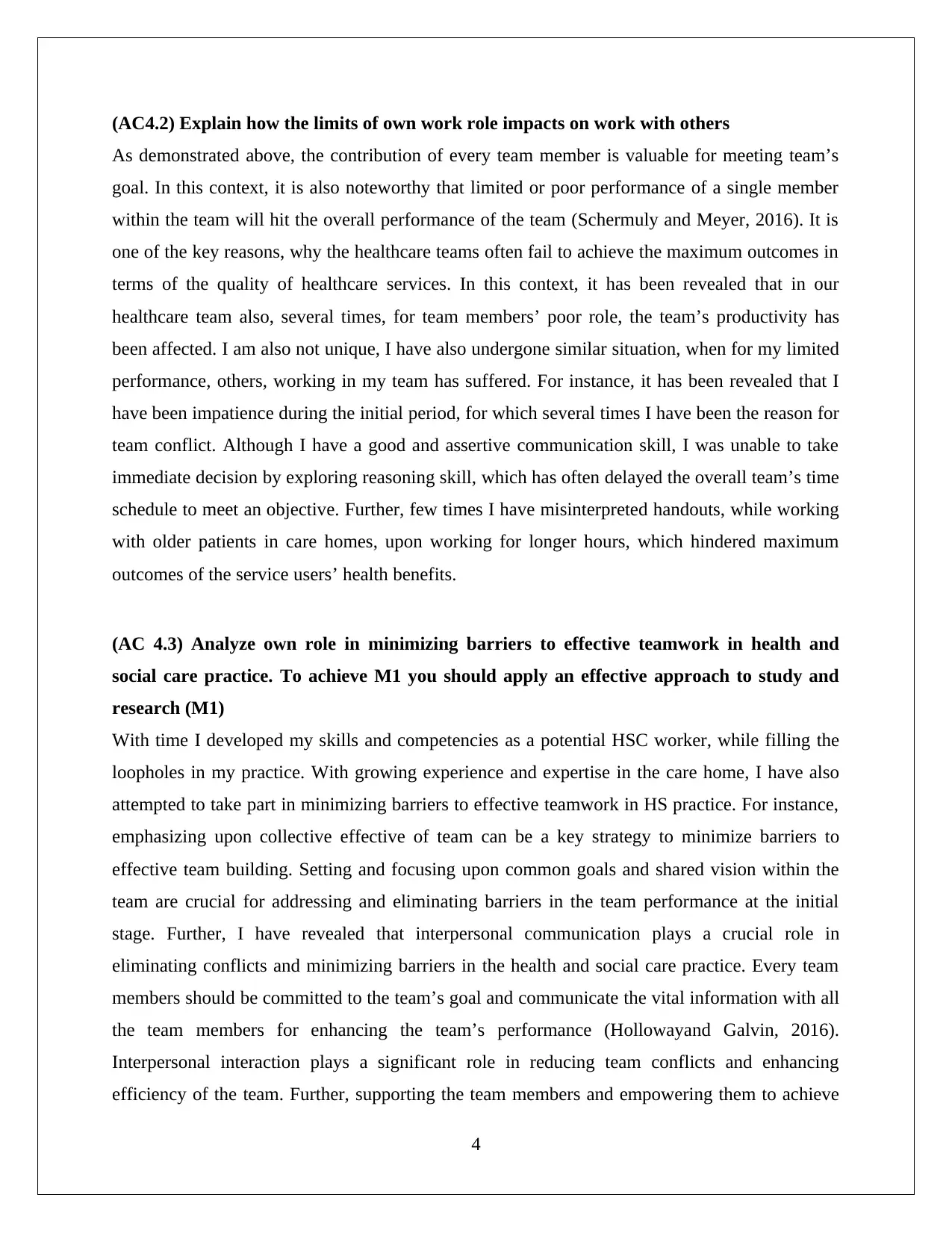
(AC4.2) Explain how the limits of own work role impacts on work with others
As demonstrated above, the contribution of every team member is valuable for meeting team’s
goal. In this context, it is also noteworthy that limited or poor performance of a single member
within the team will hit the overall performance of the team (Schermuly and Meyer, 2016). It is
one of the key reasons, why the healthcare teams often fail to achieve the maximum outcomes in
terms of the quality of healthcare services. In this context, it has been revealed that in our
healthcare team also, several times, for team members’ poor role, the team’s productivity has
been affected. I am also not unique, I have also undergone similar situation, when for my limited
performance, others, working in my team has suffered. For instance, it has been revealed that I
have been impatience during the initial period, for which several times I have been the reason for
team conflict. Although I have a good and assertive communication skill, I was unable to take
immediate decision by exploring reasoning skill, which has often delayed the overall team’s time
schedule to meet an objective. Further, few times I have misinterpreted handouts, while working
with older patients in care homes, upon working for longer hours, which hindered maximum
outcomes of the service users’ health benefits.
(AC 4.3) Analyze own role in minimizing barriers to effective teamwork in health and
social care practice. To achieve M1 you should apply an effective approach to study and
research (M1)
With time I developed my skills and competencies as a potential HSC worker, while filling the
loopholes in my practice. With growing experience and expertise in the care home, I have also
attempted to take part in minimizing barriers to effective teamwork in HS practice. For instance,
emphasizing upon collective effective of team can be a key strategy to minimize barriers to
effective team building. Setting and focusing upon common goals and shared vision within the
team are crucial for addressing and eliminating barriers in the team performance at the initial
stage. Further, I have revealed that interpersonal communication plays a crucial role in
eliminating conflicts and minimizing barriers in the health and social care practice. Every team
members should be committed to the team’s goal and communicate the vital information with all
the team members for enhancing the team’s performance (Hollowayand Galvin, 2016).
Interpersonal interaction plays a significant role in reducing team conflicts and enhancing
efficiency of the team. Further, supporting the team members and empowering them to achieve
4
As demonstrated above, the contribution of every team member is valuable for meeting team’s
goal. In this context, it is also noteworthy that limited or poor performance of a single member
within the team will hit the overall performance of the team (Schermuly and Meyer, 2016). It is
one of the key reasons, why the healthcare teams often fail to achieve the maximum outcomes in
terms of the quality of healthcare services. In this context, it has been revealed that in our
healthcare team also, several times, for team members’ poor role, the team’s productivity has
been affected. I am also not unique, I have also undergone similar situation, when for my limited
performance, others, working in my team has suffered. For instance, it has been revealed that I
have been impatience during the initial period, for which several times I have been the reason for
team conflict. Although I have a good and assertive communication skill, I was unable to take
immediate decision by exploring reasoning skill, which has often delayed the overall team’s time
schedule to meet an objective. Further, few times I have misinterpreted handouts, while working
with older patients in care homes, upon working for longer hours, which hindered maximum
outcomes of the service users’ health benefits.
(AC 4.3) Analyze own role in minimizing barriers to effective teamwork in health and
social care practice. To achieve M1 you should apply an effective approach to study and
research (M1)
With time I developed my skills and competencies as a potential HSC worker, while filling the
loopholes in my practice. With growing experience and expertise in the care home, I have also
attempted to take part in minimizing barriers to effective teamwork in HS practice. For instance,
emphasizing upon collective effective of team can be a key strategy to minimize barriers to
effective team building. Setting and focusing upon common goals and shared vision within the
team are crucial for addressing and eliminating barriers in the team performance at the initial
stage. Further, I have revealed that interpersonal communication plays a crucial role in
eliminating conflicts and minimizing barriers in the health and social care practice. Every team
members should be committed to the team’s goal and communicate the vital information with all
the team members for enhancing the team’s performance (Hollowayand Galvin, 2016).
Interpersonal interaction plays a significant role in reducing team conflicts and enhancing
efficiency of the team. Further, supporting the team members and empowering them to achieve
4
Paraphrase This Document
Need a fresh take? Get an instant paraphrase of this document with our AI Paraphraser
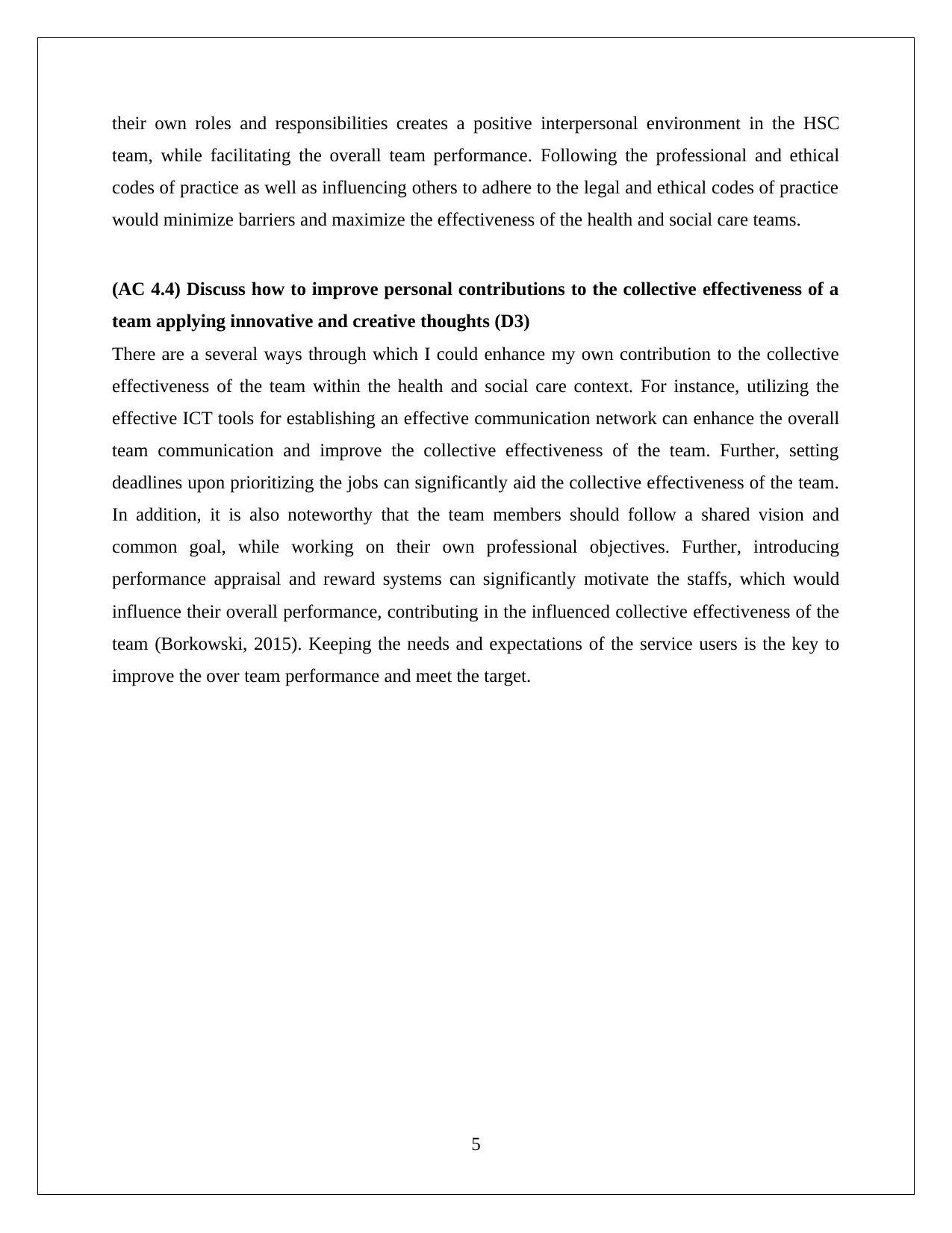
their own roles and responsibilities creates a positive interpersonal environment in the HSC
team, while facilitating the overall team performance. Following the professional and ethical
codes of practice as well as influencing others to adhere to the legal and ethical codes of practice
would minimize barriers and maximize the effectiveness of the health and social care teams.
(AC 4.4) Discuss how to improve personal contributions to the collective effectiveness of a
team applying innovative and creative thoughts (D3)
There are a several ways through which I could enhance my own contribution to the collective
effectiveness of the team within the health and social care context. For instance, utilizing the
effective ICT tools for establishing an effective communication network can enhance the overall
team communication and improve the collective effectiveness of the team. Further, setting
deadlines upon prioritizing the jobs can significantly aid the collective effectiveness of the team.
In addition, it is also noteworthy that the team members should follow a shared vision and
common goal, while working on their own professional objectives. Further, introducing
performance appraisal and reward systems can significantly motivate the staffs, which would
influence their overall performance, contributing in the influenced collective effectiveness of the
team (Borkowski, 2015). Keeping the needs and expectations of the service users is the key to
improve the over team performance and meet the target.
5
team, while facilitating the overall team performance. Following the professional and ethical
codes of practice as well as influencing others to adhere to the legal and ethical codes of practice
would minimize barriers and maximize the effectiveness of the health and social care teams.
(AC 4.4) Discuss how to improve personal contributions to the collective effectiveness of a
team applying innovative and creative thoughts (D3)
There are a several ways through which I could enhance my own contribution to the collective
effectiveness of the team within the health and social care context. For instance, utilizing the
effective ICT tools for establishing an effective communication network can enhance the overall
team communication and improve the collective effectiveness of the team. Further, setting
deadlines upon prioritizing the jobs can significantly aid the collective effectiveness of the team.
In addition, it is also noteworthy that the team members should follow a shared vision and
common goal, while working on their own professional objectives. Further, introducing
performance appraisal and reward systems can significantly motivate the staffs, which would
influence their overall performance, contributing in the influenced collective effectiveness of the
team (Borkowski, 2015). Keeping the needs and expectations of the service users is the key to
improve the over team performance and meet the target.
5
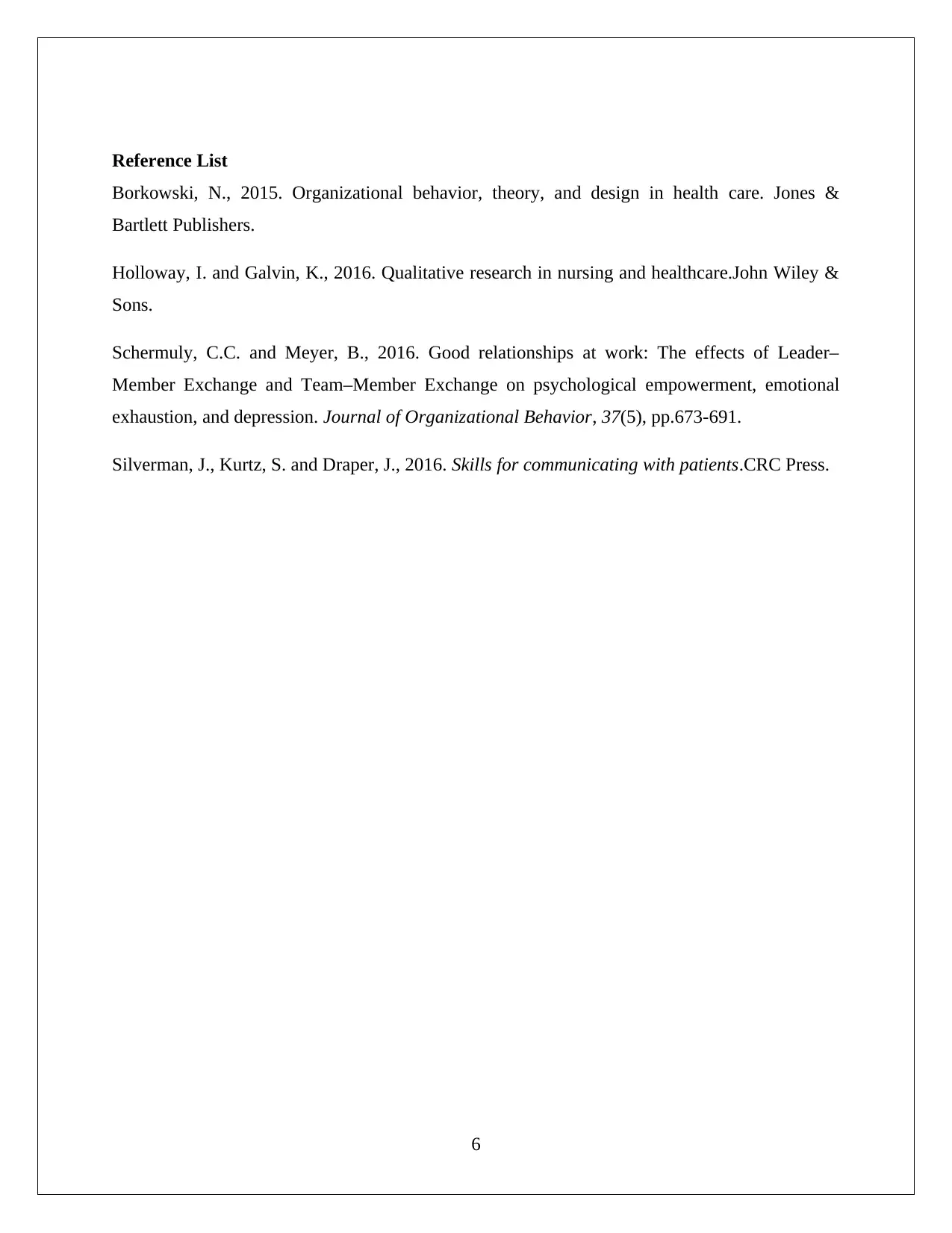
Reference List
Borkowski, N., 2015. Organizational behavior, theory, and design in health care. Jones &
Bartlett Publishers.
Holloway, I. and Galvin, K., 2016. Qualitative research in nursing and healthcare.John Wiley &
Sons.
Schermuly, C.C. and Meyer, B., 2016. Good relationships at work: The effects of Leader–
Member Exchange and Team–Member Exchange on psychological empowerment, emotional
exhaustion, and depression. Journal of Organizational Behavior, 37(5), pp.673-691.
Silverman, J., Kurtz, S. and Draper, J., 2016. Skills for communicating with patients.CRC Press.
6
Borkowski, N., 2015. Organizational behavior, theory, and design in health care. Jones &
Bartlett Publishers.
Holloway, I. and Galvin, K., 2016. Qualitative research in nursing and healthcare.John Wiley &
Sons.
Schermuly, C.C. and Meyer, B., 2016. Good relationships at work: The effects of Leader–
Member Exchange and Team–Member Exchange on psychological empowerment, emotional
exhaustion, and depression. Journal of Organizational Behavior, 37(5), pp.673-691.
Silverman, J., Kurtz, S. and Draper, J., 2016. Skills for communicating with patients.CRC Press.
6
⊘ This is a preview!⊘
Do you want full access?
Subscribe today to unlock all pages.

Trusted by 1+ million students worldwide
1 out of 6
Related Documents
Your All-in-One AI-Powered Toolkit for Academic Success.
+13062052269
info@desklib.com
Available 24*7 on WhatsApp / Email
![[object Object]](/_next/static/media/star-bottom.7253800d.svg)
Unlock your academic potential
Copyright © 2020–2026 A2Z Services. All Rights Reserved. Developed and managed by ZUCOL.





